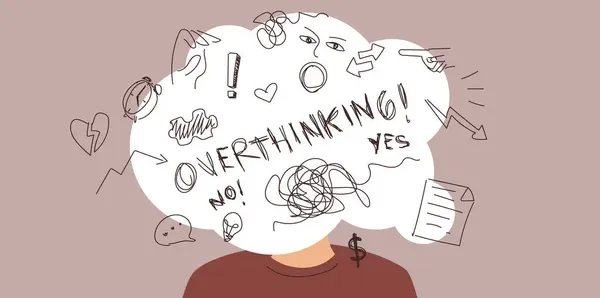
Someone has aptly said: ‘Thinkers stay thinkers and doers move on.’ However, today I discovered that overthinkers not only lag behind but also grapple with countless problems.
Now, what is overthinking exactly? What are its types and symptoms? Why do people overthink? What mental and physical ailments does it cause, and how can they be cured? These questions crossed my mind, and I sought answers from experts in this field. In this blog, we will share what the experts think about it.
What is Overthinking?
When questioned about overthinking and its symptoms, Dr. Urshi Arbab, a clinical psychologist, explained that pondering over anything, whether related to the past or the future, for hours, regardless of whether it is within your control or not, is termed as Overthinking.
Also Read: Terrorist Attack Injures Policemen in Dera Ismail Khan
Individuals grappling with overthinking are perpetually burdened by depression, and their minds become breeding grounds for negative thoughts. They also succumb to panic about events that have yet to unfold.
Dr. Urshi Arbab highlights two types of overthinking: firstly, individuals who berate themselves for past events, persistently ponder if a different decision back then could have altered their present circumstances. Despite potential innocence, they shoulder the blame on themselves, and this form of overthinking is termed rumination.
The second type involves individuals preoccupied with concerns about the future. For instance, even before exams take place, they fret over the impending results, leading to an overthinking known as worrying.
Friends play a pivotal role in everyone’s life, offering a listening ear and valuable advice. Dr. Urshi Arbab emphasizes that overthinkers often refrain from sharing their problems, generating new questions in their minds without seeking external input. Consequently, they struggle to make crucial life decisions, becoming entangled in confusion across various aspects and finding themselves unable to take meaningful action.
Effects of Overthinking on Married Life
Individuals who engage in excessive thinking, regardless of gender, often struggle to find happiness in their married life and perform their responsibilities effectively. These individuals remain perpetually lost in their thoughts, distancing themselves from the realities of daily life.
To delve deeper into this aspect, I interviewed a woman who has grappled with overthinking for several years, viewing it as the most debilitating affliction. This woman, requesting anonymity, shared that the constant mental strain has left her feeling exhausted, hindering her ability to manage household chores. Moreover, she finds herself unable to dedicate quality time to her children or fulfill her responsibilities adequately. Consequently, all her energy is consumed by unproductive thoughts, leaving little room for meaningful action.
Overthinking and Education
In our childhood, we often heard elders advising us to read with our hearts, a sentiment we now pass on to our children. This implies studying with full attention. However, for a child grappling with overthinking, being physically present in class may not guarantee focus on studies.
Discussing the impact of overthinking on academic life, Professor of Psychology at Peshawar University, Khushboo, remarked that individuals plagued by overthinking struggle to concentrate both in class and during home study sessions. Their minds, entrapped in other thoughts, hinder their ability to engage with lectures, study materials, or even pick up a book without becoming absorbed in unrelated concerns.
Physical Effects:
Dr. Urshi Arbab notes that individuals who engage in excessive thinking often experience various physical problems, with weight gain and loss being major concerns. Prolonged periods of sitting, a common behavior among overthinkers, contribute to significant weight gain. Conversely, mental stress can impact the stomach, reducing appetite and weight loss. Some may even lose touch with their hunger cues.
In addition to weight-related issues, overthinkers commonly suffer from physical ailments such as headaches, migraines, and bone pain. Addressing how to overcome overthinking, Dr. Urshi Arbab suggests that keeping oneself busy is a key strategy. Engaging in learning new things, focusing on positive qualities rather than self-criticism, and consciously stopping negative thoughts can contribute to cultivating a more positive mindset and a sense of gratitude.

